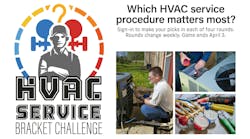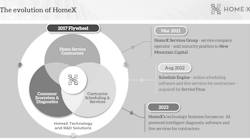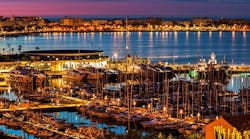The best business lessons often come from personal experiences, applied to business. All of us have them every single day, but we seldom stop and connect the dots. Sipping coffee on a hotel balcony on the Côte d'Azur in the pre-dawn hours while watching the lights of the city across the bay twinkle hardly seems to the time or place to think about contracting. However, unfamiliar circumstances seem to add a special clarity to interactions that might otherwise go unnoticed. Here are eleven.
1. Performance Pay is Timeless
The Palais des Papes in Avignon is a massive building that once was the center of Christendom. Popes lived in Avignon, not Rome during a stretch of the 14th century. A workforce that averaged 850 men each day completed most of the work over a 20 year period, which seems like a long time until you ponder U.S. highway construction. Notably, each of the tradesman was paid with performance pay. The tradesmen who constructed the palace would chisel the number of limestone blocks they laid in the stone and were paid based on the work done.
Why were tradesmen paid in this manner? Because it resulted in greater effort, performance, speed, and fairness. If anyone knew about the base motivation of man in the Middle Ages, it was the clergy. They knew what business writer Michael LeBoeuf coined as “the greatest management principle.” It is, “what gets rewarded, gets done.”
What was true 700 years ago, remains true today. If you want better performance from your field service personnel, pay for performance. After all, as a business owner, it’s how you are paid. If it motivates you, it will motivate your technicians.
2. Bundling Works
In France, food in restaurants is presented two ways. It can be presented on the “carte” (à la carte) as individual items or on the menu that includes one or two choices for each course and is bundled together for a prix fixe, or a fixed price.
The menu is a bundle. It saves the consumer a little money, but increases the total sale for the restaurant. It’s also a bundle with choices. Diners can choose each item individually or select the menu, with a reduced set of choices. The menu is simpler for most people.
This same approach can apply to replacement sales. Let people choose anything they want individually (this implies presenting a list of everything) and/or giving them a simplified set of choices. Choose this accessory item or that accessory item. Choose this brand/model and efficiency or that brand/model and efficiency. Choose this warranty/maintenance package or choose that warranty/maintenance package. It involves thinking outside the box and it involves presenting choices that may or may not be entirely equal to you in cost. The point is to give your customers both simplicity and choices.
3. Language
I’m half fluent in French. I speak just well enough to get the French to switch to English if they can. In tourist and retail areas, most can. It helps them make sales. Yet every now and then we got a little off the beaten track and encountered someone who did not speak any English. This was a challenge, but I managed to get by, but only because I could speak a little of their language. Your customers speak almost no HVAC. Do you speak to them in HVAC alone?
Thanks to the Internet, some consumers approach us half fluent in HVAC. Most are not. Unless you can speak their language, they will not understand you. Sales will be lost. Opportunities will be wasted. Money will be left of the table. Eliminate your HVAC words like SEER, AFUE, tons, load calcs, and BTUHs for consumer friendly terms.
4. Offer Unexpected Extra
The stage was set for one of our best dining experiences on this trip when a server with limited English brought us free samples of the restaurant’s gazpacho, a cold Spanish soup. It was a small and simple thing, but unexpected. It delighted us as customers. More important, it set a tone for the evening.
How can you delight your customers? What small gift can you present at the start of a service call, instead of the end? Can you find something memorable and delightful? It doesn’t even need to be directly related to HVAC.
5. Connect With the Senses
The same restaurant server came by with their specials of the day, which was fish. He showed us sea bass and flounder, fresh from the day. It was more than I wanted or could eat, but I almost ordered it anyway. As it was, I ordered a smaller sea bass plate (second of the day).
It’s not necessary to present raw fish to connect with the senses. Last night’s restaurant was chosen from a street of competitors because of the pictures of their food that were clipped above the menu. Some of the other restaurants may have had better food, but this one showed it.
How can you connect with your customers visually or otherwise? I used to play fan sounds on the computer to illustrate the difference of 0.3 dBs. It made it real.
6. Referrals are Essential
When you are traveling in unfamiliar territory – and another country with a different language is certainly that – referrals are more valued. We took referrals to heart from people we didn’t even know.
When one of your customers refers a friend or even an acquaintance, it trumps all of the marketing in the industry. It is critically important that a conscious part of your marketing strategy is to encourage your customers to recommend you to others. When they do, it’s likely a sale.
7. Review Sites Recommendations are Less Than Stellar
One popular travel review site had recent postings about construction ruining a part of Nice. We brushed off the negative reviews and went to the part of Nice people were complaining about because there is only one Nice. Yes, there was some construction, but not that much and it didn’t interfere with our ability to enjoy the quay. People exaggerate in reviews.
Anyone who’s been in business for any length of time knows the pitfalls of Internet reviews. Yet, people still rely on them to choose between one company and another. Unless you can make your brand so desirable that people choose you because there is only one you, Internet reviews will affect you.
8. Teamwork Comes From Consideration of Others
This trip involves two couples traveling together for two weeks. This had all the potential for disaster, but it didn’t happen. This is because everyone was concerned with everyone else. Everyone made adjustments for others.
Life in your company will be better if everyone can be concerned with the needs of teammates. When this happens your company truly starts acting like a team, moving in the same direction. Everyone helps each other and more gets accomplished.
9. Move Past Mistakes
Travel, especially travel to another country, involves a certain number of mistakes. On the very first day, we discovered it was a mistake to throw away the very small ticket for the Paris metro system after it was used. Even though it’s not required to exit the metro, you are required to keep it with you. There were no instructions on the ticket about this. When metro police stopped us, they understood what had happened, yet charged a 35 Euro fine anyway. Metro tickets cost less than two Euros.
While we were angry about the lack of flexibility on the part of the metro cops, the lack of information about the need to keep the ticket, and the 35 Euro fine, the choice was to stay angry and let it color the day or to brush it off and move forward. We wrote it off as a cost of travel, but were careful to keep all tickets with us going forward.
Mistakes will happen in business too. It’s part of business. Learn from the mistakes and don’t repeat them, but don’t let them control you. Move past them so you can move on with your company.
10. Service Recovery Matters
We took a river cruise down the Rhone. The cruise offered a trip to the Carmague, which is a delta region of the river known for its flamingos, wild horses, and wild cattle. The ship’s trip was by bus and lasted eight hours. We wanted a much shorter, private trip by open air jeep. Getting the i’s dotted and t’s crossed required a interaction between the customer service personnel of the ship and our travel agent. The customer service rep was poorly trained or excessively bureaucratic and refused to help, which ran counter to statements by the cruise line as well as the experience of others booking their own excursions. In short, we didn’t get to see the Camargue.
By the time the hotel manager found out what happened it was too late to correct the mistake. It wasn’t too late for service recovery. We returned to our cabin that evening to find an apology note, a nice bottle of wine, and a box of chocolates. While still disappointed about missing the Camargue, we were mollified.
You may not be able to erase a bad experience a customer has with your company, but you can recover. You can apologize for the circumstances if nothing else and give the customer something extra with the apology to demonstrate your sincerity. It could be something as simple as a restaurant or movie gift card. Buy them in bulk at a discount to use when needed.
11. Contractors Blow Truck Advertising Opportunities
French contractors do a generally poor job with truck identification. Their logos are small. They put too much copy on the sides of the truck. They fail to give people a reason to call them over another contractor.
Apparently poor truck ID is a problem in every country. Yet, the truck is the most visible billboard available to a contractor. It’s the most visible because it’s mobile. Make sure yours focuses on your logo, your services, and a reason to do business with you.
What Can You Learn?
You are probably not reading this on the French Riviera. You are probably surrounded by what seems to you as the everyday and mundane. Yet, your personal consumer experiences are likely to yield numerous lessons you can apply in your business if you stay alert for them and ready to apply them. Try it. See what you can learn each day.
###
Need a speaker for your meeting? Check out the Service Roundtable’s Speaker’s Bureau. Don’t forget to check out the FREE contractor downloads from the Service Roundtable. Call 877.262.3341 for more information.









